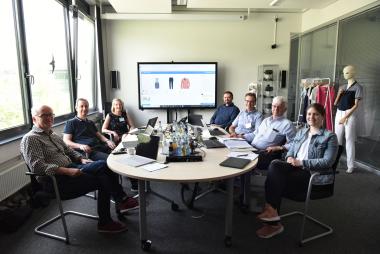MUNICH FABRIC START announces programme for upcoming event
The Munich Fabric Start Exhibitions GmbH announces the programme for the upcoming editions of MUNICH FABRIC START (24 to 26 January 2023) and BLUEZONE & KEYHOUSE (24 and 25 January 2023).
From 24 to 26 January 2023, visitors can expect a range of the latest trends, fabric, accessories and denim highlights from around 900 international exhibitors, an event programme with expert panels, keynotes and trend lectures, as well as numerous networking opportunities.
Economic Environment
Conflicts, inflation, recession, energy crisis, massive inequality, climate change - how companies can position themselves securely in a volatile market environment - this is deciphered by trend analyst David Shah in his key note "Self-Empowerment" and numerous industry experts, futurologists and leading fashion editors in the lecture series "The Status Quo of Fashion" by strategy and communication consultants Alex Vogt and Jana Kern.
Next to David Shah (View-Publications), the panel will include Siems Luckwaldt (CAPITAL and BUSINESS PUNK, RTL Germany), Shamin Vogel (WeAr Global Magazine), Ben Hanson (The Interline), Maria Cristina Pavarini (The SPIN OFF) and Carl Tillessen (DMI)
Digital Era
From digital colour apps, digital twins and virtual models to 3D simulation and virtual dressing rooms - the world of digital fashion will not only be discussed in numerous lectures in Munich, but also brought to life in the new Assyst Experience. Whether it's Carola Seybold, Head of Global Key Accounts at Pantone, Jan Hilger from Roland Berger, Arndt Johannes from Verce, Dr. Stefan Hauswiesner, CEO of Reactive Reality or the experts of the panel "Textilfabrik X.0 - New Marketing Buzz Words or One Step Ahead": everyone will be looking at virtual fashion from a different angle and providing insights into the latest state of the art. In her trend presentation "The weird & wonderful world of fashion cores" at BLUEZONE, Angela Velasquez (Rivet) sheds light on how viral TikTok trends are reshaping denim merchandising.
Sustainable Future
Digitisation and sustainability - the third major theme of the event programme - could not be more closely intertwined. Lisa Lang, Director of Policy & EU Affairs Orchestrator of EIT Climate KIC in an interview with Muchaneta ten Napel (Shape Innovate) kicks things off about the importance of a green transformation for the industry. Other topics in focus: Liv Simpliciano from Fashion Revolution gives an overview of where the world's biggest fashion brands and retailers stand in terms of transparency. Tricia Carey from Renewcell, David Shah (View-Publications), Lien van der Schueren and Guy Buyle (CISUTAC & HEREWEAR), Mateusz Wielopolski (Circulix) and Mario Malzacher (Circular.Fashion) critically discuss whether the circular economy is really the solution for everything or just a placebo. Circular ecosystems are also presented by Franziska von Becker from Hachmeister & Partner.
The race of the new sustainable materials of the future will be opened by Kirsi Terho from Infinited Fiber, Kuben Edwards from Onezero8, Marianne Uddman from Trustrace and Simon Angel, Sustainable Innovations Curator of MUNICH FABRIC START in a panel discussion with Muchaneta ten Napel (Shape Innovate). New products for a sustainable future in the denim industry will be discussed at BLUEZONE.
Another highlight: In cooperation with the Transformers Foundation, an expert panel will also be held at BLUEZONE on both days of the trade show.
Trends Spring.Summer 2024
Gerd Müller-Thomkins, Carl Tillessen and Niels Holger Wien from the Deutsches Mode Institut (DMI) see a "vibe shift" - a turning point. They will analyse what this means for fashion in their trend presentation on Wednesday. The Women's Fashion Trends SS 24 with the must haves of the season will be analysed by Karin Schmitz from the Trend Forecast Institute Peclers Paris - from the glamorous appearance in everyday life, to the play with gender identity, to simplicity combined with functionality and mobility.
MUNICH FABRIC START / KERN. Consulting







